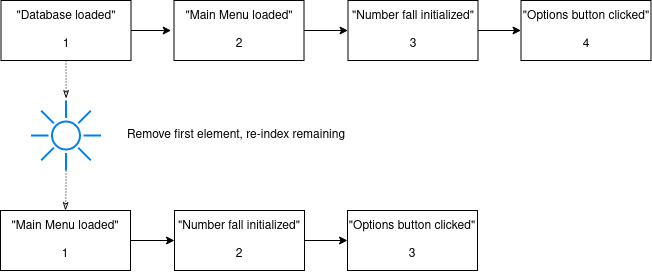Update 04 August 2023
The code presented in the first iteration of this post led to orphaned nodes that weren't being cleaned up properly. The code has been updated to free the Log nodes appropriately and comments have been updated for auto documentation.
Message queue as an Array
As discussed in the 20230621 dev log Accessible Sudoku uses a messages Array to store and forward the messages to console, whether the one built into the IDE or the in-game console. Using an Array incurs a re-index penalty when messages are removed.

Under normal operation, and with a low verbosity setting, this is fine as the message Array buffers the messages and the timer sends them.
It becomes a problem when the verbosity is set too high, developing on a low-resource machine (like a steamdeck), and for long-running tasks (most things to do in the generator).
Linked List
A Linked List is a data structure where each node contains some data and a link to the next node in the list. Since the data doesn't need to be in a contiguous block of memory, as each node knows where to find the next, there's no re-index penalty.
You got some logging in my global class
For some time now the logging functions have been held in the Global autoload / singleton. Why? yes.
Time for a dedicated logger singleton with an inner class for message nodes.
Log.gd singleton
First step is to move all the logging functions and components from Global.gd to the new singleton. Once complete, adjust all calls like Global.debug("foobar") to Log.debug("foobar").
This makes more sense and aids in maintainability of the code. Nothing worse than cursing the last dev's sloppy work only to find out it was you.
cyberpuffin@workstation:~/git/godot-sudoku$ grep -R -e 'Global.debug' -e 'Global.verbose' -e 'Global.silly' Scripts/ | wc -l
383That's a lot of manual edits. Let's make it a little easier:
cyberpuffin@workstation:~/git/godot-sudoku$ find Scripts/ -iname '*.gd' -exec sed -i -e 's|Global.debug|Log.debug|g' '{}' \;
cyberpuffin@workstation:~/git/godot-sudoku$ grep -R -e 'Global.debug' -e 'Global.verbose' -e 'Global.silly' Scripts/ | wc -l
298
cyberpuffin@workstation:~/git/godot-sudoku$ find Scripts/ -iname '*.gd' -exec sed -i -e 's|Global.verbose|Log.verbose|g' '{}' \;
cyberpuffin@workstation:~/git/godot-sudoku$ find Scripts/ -iname '*.gd' -exec sed -i -e 's|Global.silly|Log.silly|g' '{}' \;
cyberpuffin@workstation:~/git/godot-sudoku$ grep -R -e 'Global.debug' -e 'Global.verbose' -e 'Global.silly' Scripts/ | wc -l
0Followed by a bit of whack-a-bug with the editor and the debugger finding other pieces that have moved, like Global.error() and Global.message_timer.
Comparing implementations
The issues presented by the old implementation of logging mostly came up in edge cases and with the generator which is still pending conversion to Godot 4.x.
For now, the old code will remain along side the new code and a switch will be added into options to allow for A/B testing.
Linked list: Log.gd
extends Node
## Log
##
## Manage output messages to the user or developer.[br]
## Autoload: 1
## Timer interval for sending messages
const OUTPUT_MIN_INTERVAL: float = 0.075
## Verbosity levels
enum VerbosityLevel {
Quiet, ## Vital messages only
Verbose, ## Some system messages
Debug, ## More messages
Silly ## All the messages
}
## Timer to send messages on interval
var message_timer: Timer
## Reference to first log message in the list
var msg_first: LogMessage
## Reference to last log message in the list
var msg_last: LogMessage
## Last steps
func _exit_tree() -> void:
Log.clear_message_queue()
return
## First steps
func _ready() -> void:
Log.configure_timer()
return
## Add new messages to the Log queue
func add_msg_to_queue(msg: String = "blank") -> void:
if msg == "blank":
Log.error("%s: Can't add blank message to log queue." % [
"Log: add_msg_to_queue"
])
return
var new_log: LogMessage = LogMessage.new(msg)
if Log.msg_first:
Log.msg_last.set_next(new_log)
Log.msg_last = new_log
else: # empty queue
Log.msg_first = new_log
Log.msg_last = new_log
return
## Clear the message queue without waiting for the timeout
func clear_message_queue() -> void:
while Log.msg_first:
Log.send_message()
Log.verbose("Message queue cleared.")
return
## Configure the Log message timer
func configure_timer() -> void:
Log.message_timer = Timer.new()
Log.message_timer.name = "Message interval"
add_child(Log.message_timer)
Log.message_timer.autostart = true
Log.message_timer.one_shot = false
Log.message_timer.paused = false
Log.message_timer.wait_time = Log.OUTPUT_MIN_INTERVAL
Log.message_timer.start()
Log.message_timer.connect("timeout", Callable(Log, "send_message"))
return
## Debug messages
func debug(msg: String):
if !Config.verbosity:
msg = "%s: %s" % ["deferred", msg]
call_deferred("debug", msg)
elif Config.verbosity >= Log.VerbosityLevel.Debug:
Log.add_msg_to_queue(msg)
return
## Error messages send regardless of verbosity
func error(msg: String):
Log.add_msg_to_queue(msg)
push_error(msg)
return
## Non-error messages to send regardless of verbosity
func quiet(msg: String) -> void:
Log.add_msg_to_queue(msg)
return
## Send message from queue at timer timeout
func send_message() -> void:
if !Log.msg_first:
return
print(Log.msg_first.message)
if Config.show_console:
Global.console.insert_text_at_caret("%s\n" % Log.msg_first.message)
Global.console.scroll_vertical = INF
Log.msg_first.queue_free()
Log.msg_first = Log.msg_first.next_msg
return
## Silly messages
func silly(msg: String) -> void:
if !Config.verbosity:
msg = "%s: %s" % ["deferred", msg]
call_deferred("silly", msg)
elif Config.verbosity >= Log.VerbosityLevel.Silly:
Log.add_msg_to_queue(msg)
return
## Verbose messages
func verbose(msg: String) -> void:
if !Config.verbosity:
msg = "%s: %s" % ["deferred", msg]
call_deferred("verbose", msg)
elif Config.verbosity >= Log.VerbosityLevel.Verbose:
Log.add_msg_to_queue(msg)
return
## Log Message node
##
## Nodes in a linked list that carry log messages
class LogMessage:
extends Node
## Message data to send to output
var message: String
## Link to next message in list
var next_msg: LogMessage
## Store message data
func _init(msg: String = "blank") -> void:
if msg == "blank":
Log.error("%s: Can't create empty Log Messages." % [
"Log: LogMessage: _init"
])
else:
self.message = msg
self.name = "Log Message"
return
## Set link to next message in list.
func set_next(next: LogMessage) -> void:
if self.next_msg:
push_error("Next message is already set.")
return
self.next_msg = next
return
Here's the final script with the Linked List implementation. Whether it works where the Array-based message queue failed is yet to be seen.
Reference
- https://en.wikipedia.org/wiki/Linked_list
- https://www.geeksforgeeks.org/data-structures/linked-list/#
Versions
Godot: 4.0.2

Comments